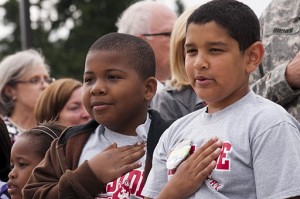 Teachers in one Nebraska school district have been instructed to stop using gender-specific language when addressing students.
Teachers in one Nebraska school district have been instructed to stop using gender-specific language when addressing students.
According to National Review Online, teachers at the Lincoln Public Schools have been told that phrases like “boys and girls” are not “gender-inclusive” and should not be used in the classroom.
So what, you might ask, are teachers to call their students? The training handout says, “Create classroom names and then ask all of the ‘purple penguins’ to meet on the rug.”
Instead of lining students up as “boys and girls,” the training material advises teachers to separate students according to their likes or interests, such as “skateboards” or “listening.” It even suggests separating students according to whether or not they are athletes–as if that isn’t going to make the classroom a charged environment. Does anyone really think labeling students according to their athletic prowess is somehow better than calling them a “boy” or a “girl”?
What is most striking about the material, however, is its instruction that teachers literally should be intolerant of opposing views. The handout reads,
“Be intolerant of openly hostile attitudes or references towards others EVERY TIME you hear or observe them, but also use these as teachable moments. Take the opportunity to push the individual on their statements about gender. Being punitive may stop the behavior, at least in your presence. Being instructive may stop it entirely.”
But just a paragraph or two later, the material states,
“Help students recognize ‘all or nothing’ language by helping them understand the difference between patterns and rules. Teach them phrases like ‘That may be true for some people, but not all people,’ or ‘frequently, but not always,’ or ‘more common and less common.’ Avoid using ‘normal’ to define any behaviors.”
Now, yes, teachers should step in any time they see a student mistreating another. However, that’s not what this pamphlet is addressing. It encourages teachers to be “intolerant” of attitudes that align with a traditional understanding of gender, and says teachers should try to change students’ beliefs on the subject. This is important to note. An attitude and an action are not necessarily the same thing. In school, we correct behavior–not belief.
Interestingly, the pamphlet also says teachers should avoid all or nothing language. Even calling something “normal” is out. Things are simply more common or less common.
Presumably, however, these rules do not apply to traditional beliefs about gender. If a student were to say he or she believes God created people in His image, distinctly male and female, that wouldn’t be a “more common” or “less common” belief about humanity. That’s an openly hostile attitude the teacher is obligated to correct.
Not surprisingly, the training material given to teachers was produced by Gender Spectrum, a group that “provides education, training and support to help create a gender sensitive and inclusive environment for all children and teens” and the Center for Gender Sanity.
Nebraska may seem far away from Arkansas, but if public school teachers up there can be subjected to this kind of agenda, there is no reason to believe our teachers couldn’t be also.
Click here to read the handout given to Nebraska school teachers.




